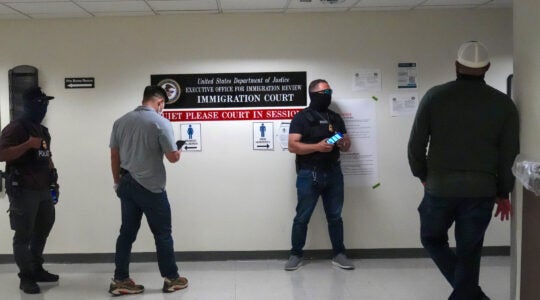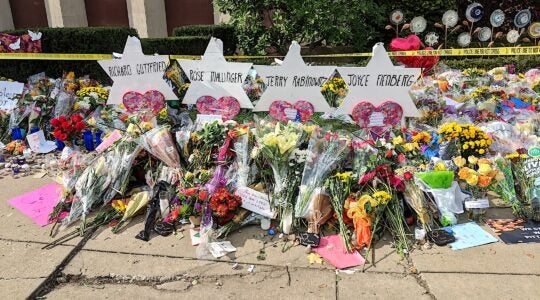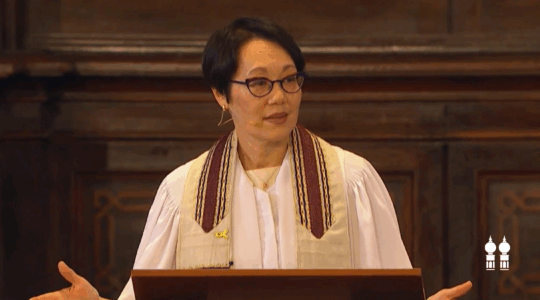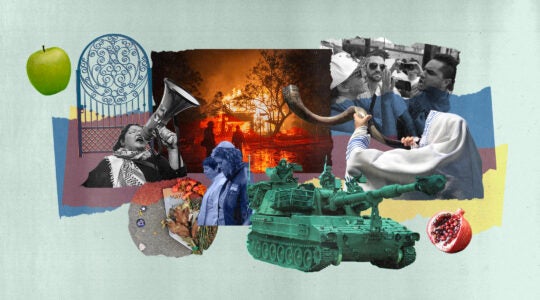(JTA) — When I first met Keith Siegel, he was the last of four siblings still at home. He was in high school, and I remember him pedaling off early in the morning.
I was in a different world, graduate school, and was renting a room from his parents as I needed a quieter place for writing my dissertation than the graduate dorm. Keith was reserved like his father Earl, a professor of maternal and child health. His mother, Gladys, was lively; she had been a nurse, and now was busy with creating batik garments and attending board activities at Beth El Synagogue in Durham, North Carolina. I became like a member of the family.
Keith and I shared a bathroom. Gladys made my veil when I married more than four decades ago. It’s been several years since Earl passed away. Today Gladys lives in an assisted-living facility where the staff have done an excellent job of protecting her from knowing that her youngest son is a hostage somewhere in Gaza.
Two Siegel children, Lee and Keith, made aliyah to Israel many years ago. I knew where Kibbutz Gezer, where Lee and Sheli Siegel lived, was, but I was not aware of the location of Kibbutz Kfar Aza, where Keith and his wife Aviva lived — or how close it is to the Gaza border.
Now I do.
On Oct. 7, an estimated 100 members of the Kfar Aza community were killed. Keith and his wife Aviva were driven into Gaza in their own car, taken captive along with some of their neighbors. Aviva was released in November, along with 100 women, children and non-Israelis as part of a 10-day truce. She said Keith’s ribs had been broken during their capture but that she was with him until the day she was told she was being sent home.
“I gave him a hug and I told him to be strong for me and that I’ll be strong for him,” she said.
I spent nearly all of last month in Israel, wanting to show solidarity as so many others have done, including my rabbi. I traveled alone, hoping to see my cousins — all native Israelis — some friends, and others who have made aliyah recently. I went on this trip ostensibly for them, to let them know Americans are with them. And I hoped, in my own small way, to help the Israeli economy. But I also went for myself. I wept as I watched the news and bristled as I heard report after report about antisemitism. I wanted to demonstrate strength, too.

A hostage poster showing Keith Siegel can be seen at Israel’s Ben-Gurion Airport. His wife Aviva was freed from Gaza in November, but posters from when they were both hostages can still be found if one looks carefully across Israel. (Jane Gabin)
Right at Ben-Gurion Airport, in the row of hostage posters arrayed alongside the iconic ramp that arrivals must traverse, one of the first faces to greet me was Keith’s.
I had recognized Keith in the portraits his friends and family painted as they sought to raise attention to his plight in the weeks after Oct. 7.
“He’s a kind, soft-spoken, reflective kind of person, very considerate, thinking of others. That’s his temperament, his way of being in the world,” his brother David said on “Good Morning America” in November.
Keith was about as gentle-spirited, decent as a guy you ever met,” Alon Tal, the former member of the Israeli Knesset who also grew up in Durham, told our local news channel. “A very kind person.”
Now I saw his face wherever I went. In Tel Aviv, Ra’anana, Netanya and Jerusalem — there was Keith, standing out among the dozens of other faces that Israelis see everywhere they go: on trains and buses, in restaurants, on the street, in shopping malls, in the window of an historic house, on banners strung between posts on Rothschild Boulevard.
In the United States, the hostage posters have been so often torn down, by people who probably couldn’t find Gaza or Israel on a map. In Israel, these signs are sacred.
I had promised friends at home that I would post something each day, and I did. Pictures of Keith and the other hostages dominated.
In Tel Aviv, I made a pilgrimage to Hostage Square, the area in front of the Tel Aviv Museum of Art, where I joined a huge outpouring. Lee and Sheli were there, too, but there was no way for me to connect with them in the overwhelming crowds. Thousands listened as a boy and his sister pleaded for the release of their grandfather. Keith, whom I kept thinking of as a teen, is a grandfather, too, five times over.
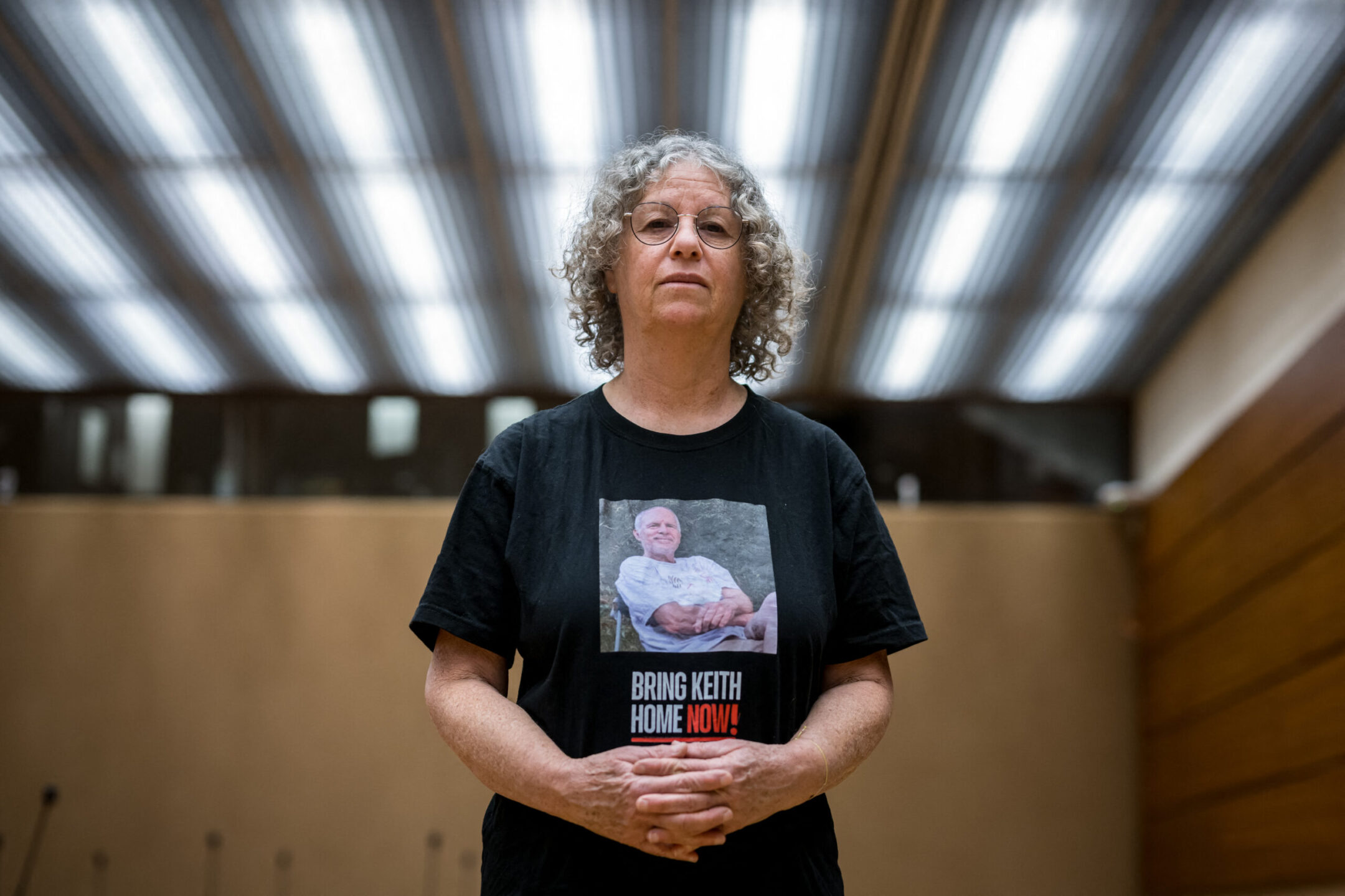
Former Hamas hostage Aviva Siegel poses with a T-shirt showing a picture of her husband Keith Siegel during her visit to the 55th session of the UN Human Rights Council in Geneva, Feb. 28, 2024. (Photo by Fabrice Coffrini / AFP via Getty Images)
Aviva Siegel has been working unceasingly to gain her husband’s release, traveling to Geneva, testifying in the Knesset and speaking at rallies. Lee and Sheli, too, have been doing everything they can. They told me, when I saw them at their home at Kibbutz Gezer, that they have felt extremely supported by the U.S. Department of State — but not by their own government in Israel. They told me, too, that the spot on Keith’s forehead in the picture was henna, from a party he attended not long before the world changed.
Kibbutzim are cooperative communities, and Gezer seemed an idyllic place to raise children, as Lee and Sheli did. There is a dining hall, children’s centers (with an outdoor area for their rabbits), play areas, communal picnic sites, a ballfield (Kibbutz Gezer has baseball), a library, and many other delights. Lemons and other fruit grow abundantly right next to residents’ homes; I took a lemon, picked right from the Siegels’ tree, back to my home in North Carolina.
Others have taken back weightier relics of their visits: On the day I was at Gezer, Lee and Sheli shared Keith’s story with a visiting synagogue group from England, who promised to tell it in the United Kingdom.
This month, Keith’s sister Lucy and niece Hanna attended President Joe Biden’s State of the Union address as the guests of our senators in North Carolina. They wore yellow scarves like the other American family members of the Israeli hostages who also sat in the hallowed government chambers. Their presence eked out hope at a time when the prospects feel dim for another deal that could result in hostages like Keith going free, and as another one of the remaining American hostages was revealed to be dead.
Then I remember leaving Israel a few weeks ago. There was Keith again at the airport. He was no closer to being released than when I arrived.
JTA has documented Jewish history in real-time for over a century. Keep our journalism strong by joining us in supporting independent, award-winning reporting.


